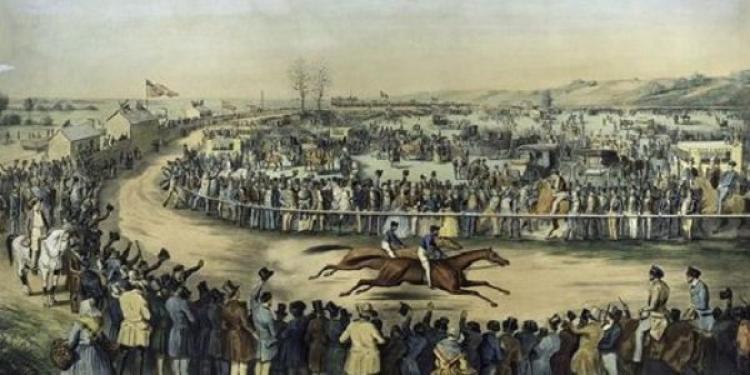A History of Gambling in America (part6)
Posted: July 26, 2015
Updated: October 6, 2017

The beginning of the fight for American Independence was funded by the lottery
With the first hangings of gamblers in 1856, gambling in San Francisco would turn heads and warn those gamblers of a threat. Before long, US gambling laws were put into place that would limit casino gambling all together. Gambling in California still remained underground in places like San Francisco Chinatown and Los Angeles, but didn’t rise nearly to the prominence of San Francisco.
• There were 314 race tracks in the United States by 1897
• Victorian morality that looked down on gambling popular in the U.S.
• By the end of the 19th century 35 states prohibited gambling
As the Civil War ensued, soldiers would spend the vast amount of hours on the battle field without anything to do. As a result gambling proved rampant by both the Union and Confederate Armies. Gambling activities included horse racing, various types of poker, blackjack, faro, keno, cockfighting and racing lice. Although General Grant of the Union Army was a card player and didn’t mind the activities, the Confederate leader Robert E. Lee was surprised when confronted with the realities of his soldier gambling.
Horse racing made a comeback in a big way

In the late 1800’s, horse racing started to make a resurgence in popularity among bookmakers and betters. Since the 1700’s, bookmakers have been facilitating the sport. A Bookmaker, which got its names from the phrase “taking book”, kept records of bets. Their roles were to study the horses in the right way so they can accept bets on a horse’s chance at winning.
If the horse didn’t have as much of a chance at winning, the bookmaker would accept bets at high odds meaning if the horse won, betters would get more money. By 1897, there were 314 race traces in the United States. Of course whenever proper wagging took hold, gamblers would find ways to cheat the system. With that came inside information and bribes.
A man named Pittsburg Phil, who was losing so much money because of the corruption, had an idea how to solve his problem that would quickly make gambling news. Meeting a Jockey named Tom Sloan, Phil offered him USD 400 dollars to simply win the race. Phil’s logic as that he wanted to guarantee that there was at least one honest jockey out there. Phil planned worked after cleaning out the bookmakers and left town. Phil had a penchant for numbers and figuring out the odds that bookmakers tried to give.
Once he won a racehorse and another time he won USD 100,000 against another gambler. Phil won millions in his career based on his knowledge of probability. His last bet before dying in a sanitarium in North Carolina, upon hearing from the doctor he had 24 hours to live, he made a wager for USD 10,000 that he could live longer. He would end up victorious by 30 minutes the next day.
John Gates’ love for gambling created a lack of love by society

John “Betamillion” Gates was a gambler, who had the opposite mentality of Pittsburg Phil. Unlike the calculating mathematical technician Phil was, Gates was a millionaire who felt that life was a gamble. It was common for Gates to bet on everyday events such as “how long it took a fly to land on a sugar cube?” or he waged on two raindrops flowing down a window. Gates viewed everything he did including his business as a gamble.
Often Gates would pay the price for his creed. He once lost USD 375,000 at the Saratoga Track in one afternoon. Due to the height of Victorian morality, Gates was snubbed by other wealthy individuals such as J.P Morgan. Much of higher society looked down on gambling as a “classless activity.” Gates supposedly said “you might as well the wind to stop blowing as to tell the people to stop gambling.”
In this time lotteries also made a comeback in the South. Originally reinstated to produce revenue to rebuild war-ridden south, lotteries took hold quickly. The Louisiana Lottery company proved to be the most popular as it was granted a 25-year contract in 1868. A carpetbagger, northerner, criminal cartel from New York was able to successfully bribe the Legislature and made US gambling news by deeming their Louisiana lottery as the only provider.
Unfortunately, Congress later enacted prohibition against the transportation of lottery tickets across state lines. This soon led to the Louisiana lotteries demise in 1895. In the midst of large scale bribery throughout the legislation, laws were put into to place banning lotteries. Thirty-five states in the U.S. had constitutions prohibiting lotteries by 1900. Although the slot machine was invented in California in 1910, by that time all forms of gambling was officially outlawed in the U.S. Only horse racing would remain.












